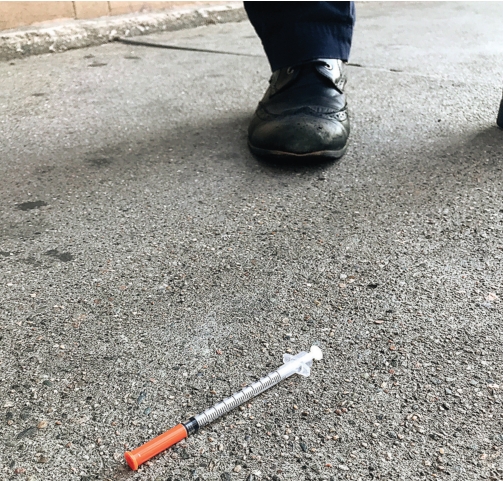
Boston continues to lose the fight against discarded, dirty needles in public parks. A growing number of residents have reported finding used syringes on public sidewalks and parks.
An
analysis of 311 data, a nonemergency phone line for reporting anything
from potholes to public drug use, shows that loose needle complaints
citywide are up 42.1%, this year over the same January 1 to May 6 period
last year.
That trend
is so far keeping with the sharp rise in loose needle reports from 2023
to 2024, which saw a 45% increase as of year-end data. Needle pickup
requests peaked in 2020, at 14,106 requests, then sharply declined to
7,868 requests in 2021 and remained consistent over the next three years
before the 2024 spike, at 10,739 requests.
In
some neighborhoods, the rise in loose needle reports is particularly
drastic. In the South End, reports are up 60% this year compared to the
same January 1 to May 6 period last year. In Roxbury, its 99%.
In
an email statement, a spokesperson for Mayor Michelle Wu’s office
acknowledged that removal of used needles was a top priority and said
that “an increase in needle complaints this time of year is consistent
with what we’ve observed in years past when the weather gets warmer, and
more people are outside. The city has also made a targeted effort to
educate people about the 311 service and encourage them to report needle
sightings.”
However,
as of the deadline, the city had not responded to a follow-up question
on the significance of a 42.1% increase in reports for the same
comparable time period last year or answered whether they attributed the
year-to-date increase in community engagement to use of the 311
reporting system.
It
was also unclear how the city viewed the impact of the sweeping of the
Mass. and Cass homeless encampment and the ending of the Community
Syringe Redemption Program (CSRP).
In
the statement, the city acknowledged that there was an increase in 311
calls following the dispersing of the Mass. and Cass encampment in 2023,
while the CSRP was still active. The statement said that “the numbers
for spring 2025, without CSRP operating are comparable,” but did not
respond to a request for clarification.
The
CSRP was a pandemic era American Rescue Plan Act (ARPA) funded program
that began in late December 2020 and ended in June 2024 when funding ran
out. Through mobile collection spots, the CSRP offered drug users up to
$10 a day per person to collect and return used needles at 20 cents per
syringe.
In 2024, the CSRP cost $1.2 million in APRA funding, which has since ended.
During
the time period when the CSRP was active, the program returned almost
80 percent of the total volume of used needles collected in some months,
ranging from 25,000 to 35,000 needles a week.
The
spokesperson also emphasized that the end of the CSRP was motivated not
only by funding limitations, but by concerns from residents about the
congregation of individuals participating in the program. “CSRP’s
approach was not consistent with our goals to end congregation and
active substance use and dealing in this area,” the statement read.
To
replace the program, the city and the Boston Public Health Commission
have expanded several other syringe cleanup initiatives. These include
the Mobile Sharps Team, which performs daily sweeps of parks and school
areas and responds to 311 requests with a 99.9% on-time rate and a
42-minute median response time.
Another
key program, Back2Work, is a partnership with the Newmarket Business
Improvement District that employs individuals in early recovery to clean
streets and engage with community members. It was expanded in July
2024.
Despite these programs, the absence of the CSRP has left a noticeable gap, as reflected in the latest 311 data.